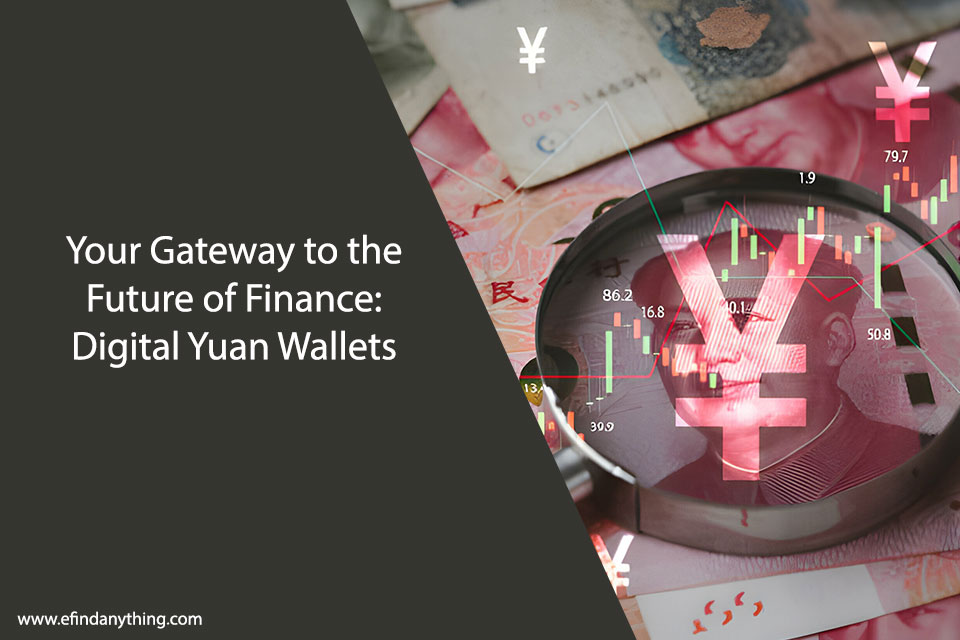
The world of finance is undergoing a transformative revolution, with digital currencies at the forefront of this change. One digital currency that has garnered significant attention is the Digital Yuan. As we explore the future of finance, it’s essential to understand the role of Digital Yuan wallets in shaping this landscape. In addition, you can find an investment education company to start your learning journey by visiting this source.
Table of Contents
Understanding Digital Yuan
What is Digital Yuan?
The Digital Yuan, also known as the Digital Currency Electronic Payment (DCEP), is the digital counterpart of China’s official fiat currency, the Renminbi (RMB or CNY). Unlike cryptocurrencies such as Bitcoin, the Digital Yuan is issued and controlled by the People’s Bank of China (PBOC), making it a central bank digital currency (CBDC).
Key Features and Benefits
- Security: The Digital Yuan leverages advanced encryption and security features, ensuring a high level of protection against counterfeiting and fraud.
- Accessibility: It is designed to be accessible to all residents, including those without a traditional bank account, promoting financial inclusion.
- Traceability: Transactions made with Digital Yuan are traceable, providing transparency and accountability in financial activities.
Regulatory Framework and Government Support
The Chinese government has been actively promoting the development and adoption of Digital Yuan. It has implemented regulatory frameworks to ensure its smooth integration into the financial ecosystem. This support has spurred the growth of various digital yuan wallet solutions.
Digital Yuan Wallets: The Basics
Definition and Purpose
Digital Yuan wallets are software or hardware tools that allow individuals and businesses to store, manage, and transact in Digital Yuan. These wallets serve as the bridge between the traditional financial system and the digital currency world.
Different Types of Digital Yuan Wallets
There are two primary types of Digital Yuan wallets:
- Mobile Wallets: These are smartphone applications that enable users to access and manage their Digital Yuan holdings on the go.
- Hardware Wallets: These physical devices offer a more secure option for storing Digital Yuan, as they are offline and less susceptible to cyberattacks.
How to Obtain a Digital Yuan Wallet
To obtain a Digital Yuan wallet, individuals typically need to register with an approved financial institution or through a government-backed platform. This ensures compliance with regulatory requirements and security standards.
Security and Privacy in Digital Yuan Wallets
Importance of Security
Digital Yuan wallets prioritize security to protect users’ funds and data. They employ robust encryption techniques and multi-factor authentication to safeguard against unauthorized access and fraud.
Encryption and Authentication Measures
- Private Keys: Users are provided with private keys to access their wallet, which must be kept confidential.
- Biometric Authentication: Some wallets use biometric features like fingerprint or facial recognition for added security.
Privacy Concerns and User Data Protection
While Digital Yuan transactions are traceable for regulatory purposes, privacy concerns exist. It’s crucial to balance transparency with the protection of users’ personal information and transaction history.
Using Digital Yuan Wallets for Everyday Transactions
Payments and Transfers
Digital Yuan wallets enable users to make payments and transfers seamlessly. Whether it’s buying groceries, paying utility bills, or sending money to family and friends, the Digital Yuan is becoming a widely accepted means of payment.
Merchant Adoption and QR Code Payments
Merchants across China are increasingly accepting Digital Yuan payments. QR code-based transactions have become commonplace, making it convenient for both customers and businesses.
Integration with Existing Financial Systems
Digital Yuan wallets are being integrated into existing financial systems, allowing users to link their wallets with bank accounts and conduct financial transactions seamlessly.
Future Possibilities with Digital Yuan Wallets
Cross-border Transactions and Internationalization
China is actively exploring the use of Digital Yuan for cross-border trade settlements. This could simplify international transactions, reduce currency conversion costs, and enhance economic cooperation.
Smart Contracts and Programmable Money
The Digital Yuan has the potential to support smart contracts and programmable money, enabling automated and self-executing financial agreements.
Potential Impact on Traditional Banking
The growth of Digital Yuan wallets may challenge the traditional banking sector, prompting banks to adapt to the evolving financial landscape.
Challenges and Concerns
Security Vulnerabilities and Fraud Risks
Despite security measures, Digital Yuan wallets remain susceptible to hacking and fraud. Continued efforts are needed to enhance security.
Centralized Control vs. Decentralization
The centralization of Digital Yuan under the PBOC raises questions about the degree of control and privacy afforded to users.
User Adoption and Education
Achieving widespread adoption requires educating the public on the benefits and proper use of Digital Yuan wallets, addressing concerns, and ensuring user-friendly interfaces.
Conclusion
Digital Yuan wallets are at the forefront of the future of finance, offering a secure and accessible way to transact in the Digital Yuan. As the financial landscape continues to evolve, staying informed about the opportunities and challenges associated with these wallets is essential. Embracing the future with Digital Yuan wallets opens doors to a more efficient and inclusive financial world.





